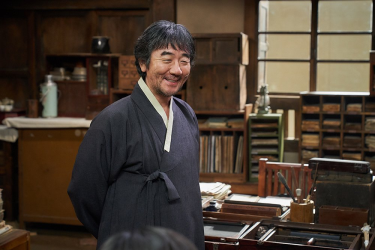When The Boy and I walked out of the theater from this one, we had never been more proud to be Koreans.
Which, of course, you know. But the point is, I grew up in an America where patriotism was corny at best and in bad taste at worst. Now it’s considered racism and Nazi-ism. Ironic, I suppose, given America’s role in WWII, but there is a pervasive and persistent meme that has America turning into the bad guys instantly after winning the war. (The Soviets started it and lives a life long after we have buried them.)

Without us, these guy’s’d be speaking Japanese.
It’s not surprising then, that you if you want to see a pro-America movie, it has to come from a different country (like last year’s Detective Chinatown 2). Even if it’s just marketing, people of other countries figure Americans like to hear good things about their own country. Truer than you might think, but less true than you’d hope in a time when a substantial portion of the population seems bent on destroying the country.
Now, Koreans? They got none of that.
Even in a damned historical zombie movie, it’s only Love Of Korea that’s going to carry the day—no matter how weak the the leaders are and how corrupt the government, and no matter how thoroughly under Japan or China’s thumb they are.

They keep the “hentai” in the basement.
We like that. You know, I love that, in America, you can talk about how much you hate America. But it’s way overdone in the arts, and so bad that you can’t even count on the President of the United States being a booster. (The Flower still talks about my “malaise speech” rant.)
In this movie, the Japanese are in their 33rd year of occupying Korea. The situation is so dire, some Koreans think this is the new normal, and Japanese have been carrying out their program of cultural genocide by forbidding schools to teach Korean. Some Korean children have never spoken anything but Japanese. (They are being raised to be imperial cannon fodder in the less cultural part of the genocide.)
Enter into this a brave lexicographer, who runs one of the last allowed Korean language magazines, and who is being pressured by his father to join the Japan-Korea alliance—another front in the war against Korean culture. He and his ragtag group are assembling words from all the many dialects of Korean, and trying to create a “standard Korean” from that. This is difficult given the Japanese are inclined to kill anyone trying to preserve Korean culture.
The unlikely hero of the piece is an illiterate petty thief, who accidentally swipes the unfinished dictionary when he steals our lexicographer’s briefcase. The lexicographer tracks him down and fetches the contents back, but this begins a relationship when it turns out the team’s eldest member knows the thief from a stint he did in jail. Not surprisingly, most of the dictionary team have family members in jail and/or have been there themselves.

He literally saves this guy’s ass.
As a result our thief ends up helping around the office and learning to read and write. Meanwhile, the pressure is on: The Japanese shut down all the remaining Korean papers, and a raid results in one member of the team being captured and tortured and much work being destroyed, to say nothing of the trust of the team members.
At the same time, the team has to finish ASAP, or they may never finish.
Even our humble thief is getting pressure at home: His son (who’s around 13), desperate for his dad to stay out of jail, doesn’t want to speak Korean at home. (He gets beaten for lapses at school.) He doesn’t want dad to teach his baby sister Korean, either.

Shopping for glasses in occupied WWII-era Korea.
It’s more exciting than you might think a book about putting together a dictionary would be. And in classic Korean style, incompetent bureaucracy and foreign tyrants war with the People Of Korea, who are not limited to the rich, or the middle class, or even non-felons.
And you don’t really know if the dictionary is going to get made (unless you’re more familiar with Korean history than I am) or which characters are going to live or die. I assume most of the liberties were taken with the dramatic aspects. Other Korean movies we’ve seen have offered fanciful takes on well-known (to Koreans) historical events.
We decided we may have enjoyed the comedy cop flick a little better, but there is a value to patriotism, to racial/tribal pride, and even to nationalism, and it’s just not something that can be found in modern American movies.
It’s not that we mind re-watching Frank Capra, Michael Curtiz, et al. But there should be somebody out there now making movies that celebrate our country.

THRILL to the harsh grading of spelling papers!
